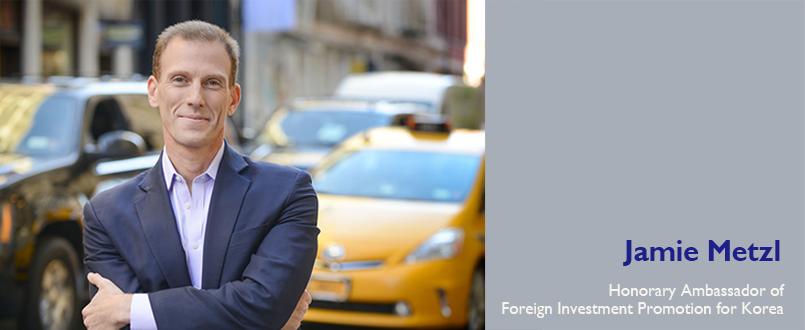

As an Honorary Ambassador of Foreign Investment
Promotion, Jamie Metzl is working tirelessly to strengthen
relations between Korea and the United States
Since being appointed Honorary
Ambassador of Foreign Investment Promotion for Korea in
2013, Jamie Metzl has been
actively promoting Korea’s optimum
investment environment in the United
States. With Korea-U.S. ties becoming
more complex than ever, Metzl is determined to strengthen bilateral relations
during his second term as honorary
ambassador. We talked with the novelist,
commentator and expert in Asian affairs
on what American companies should
look out for when doing business in the
country.
I’m a Senior Fellow of the Atlantic
Council, novelist, blogger, syndicated
columnist, media commentator and
expert in Asian affairs and biotech-nology
policy. I previously served as Executive
Vice President of the Asia Society,
Deputy Staff Director of the U.S. Senate
Foreign Relations Commi-ttee, Senior
Coordinator for Interna-tional Public
Information at the U.S. State Department,
Director for Multilateral Affairs on the
National Security Council and as a
Human Rights Officer for the United
Nations in Cambodia. I’m also a former
Partner and current Advisory Board
member of a New York-based global
investment firm and am on the Advisory
Council to Walmart’s Future of Retail
Policy Lab.
I appear regularly on national and international media discussing Asian
economic and political issues and my syndicated
columns and other writing on Asian
affairs, genetics, virtual reality and other
topics are featured regularly in publications around the world. I’ve written four
books, the last two of which are my science fiction novels Genesis Code and
Eternal Sonata. I hold a Ph.D. in Asian
history from Oxford, a JD from Harvard
Law School, am a graduate of Brown
University and, for whatever it’s worth,
have completed 13 Ironman triathlons, 29
marathons and 15 ultramarathons.
I’ve always been fascinated by Korea, so when I joined the Asia Society I pushed hard for greater engagement with the country. It was my great honor to work with people like Lee Hong Koo, Ban Ki Moon, Richard Holbrooke and Shin Dong Bin to help bring the Asia Society Korea Center to Seoul. The more we did with Korea and Koreans, the more enthralled
I became with the history, culture, vitality, passion and sheer determi-nation of the Korean people. Since then,
my passion for Korea has only deepened.
Korea has come such a long way from
being one of the world’s least advanced
countries in the 1950s to becoming one of
the most today. I always tell people that
the smartest bet a person can make is to
bet on the Korean people. If there is a
task to be done, Koreans will stop at
nothing to get there. It is telling that so
many Koreans lined up to give their gold
to the central bank during the 1997 financial crisis.
My biggest goal is to help deepen the economic and social relationship between Korea and the United States. Our two countries have been joined at the hip for almost eight decades but there is still a great deal of work to be done, especially in such challenging times as today.
American companies have a growing interest in Korea, but their focus is shifting. As China plays a greater role in traditional manufacturing, American companies look increasingly to Korea for innovation in the technology, culture and beauty industries. Because of its strong work culture, empowered workers, spirit of innovation and rule of law, Korea can also be a safe platform from which to engage the broader Asian market.
Spend time getting to know the people and culture of Korea. Once you
do, you will see that Korea’s
tremendous potential is only beginning to be unlocked.
U.S. investors know a lot about
Korea’s chaebol but less about the many
small and medium sized enterprises
beginning to emerge in Korea, so introductions to these companies are extremely
useful. For U.S. companies seeking to
potentially make larger industrial investments in Korea, the Korean government
has some superb incentive programs
designed to make the economics of locating to Korea as enticing as possible. Ask
for what you need and there’s a decent
chance you’ll get it.
The United States is undergoing a difficult
and uncertain political phase, but the
Korea-U.S. relationship
is greater than any individual leader and will endure. When the American political situation becomes more normalized, there will be an unparalleled opportunity for our two countries to work far more closely together to further build our economies, spur global innovation and address some of the greatest challenges of the 21st century.